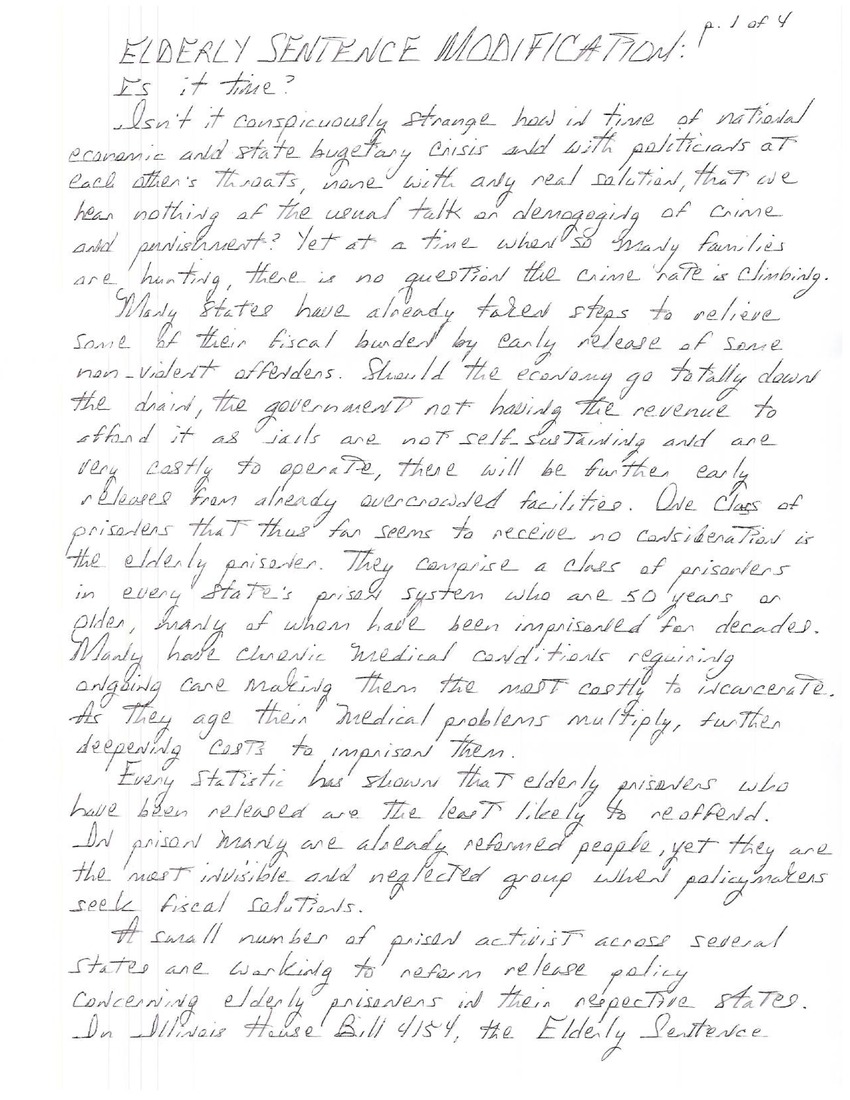
Transcription
ELDERLY SCENTENCE MODIFICATION
Is It Time?
Isnt it conspicuously strange how in time of national, economic and state budetary crisis and with politicians at each others throats, none with any real solutions; that we hear nothing of the usual talk on demogoging of crime and punishment. Yet at a time when so many familys are hurting, there is no question the crime rate is climbing.
Many states have already taken steps to relieve some of their fiscal burden by early release of some non-violent offenders. Should the economy go totally down the drain, the government not having the revenue to afford it as jails are not self-sustaining and are very costly to operate, there will be further early releases from already overcrowded facilities.
One class of prisoners that thus far seem to receive no consideration is the elderly prisoner. They comprise a class of prisoners in every state's prison system who are 50 years or older, many of whom have been imprisoned for decades. Many have chronic medical conditions requiring ongoing care making them the most costly to incarcerate. As they age their medical problems multiply, further deepening costs to imprison them.
Every statistic has shown that elderly prisoners who have been released are the least likely to reoffend. In prison many are already reformed people, yet they are the most invisible and neglected group when policymakers seek fiscal solutions.
A small number of prison activists across several states are working to reform release policy concerning elderly prisoners in their respective states. In Illinois House Bill 4154, the Elderly Scentence Advisement Act has received some attention before the Illinois House of Representative Prison Reform Committee. HB4154 as presently written would allow prisoners who have served 25 consecutive years and reached age 50, and who demonstrate genuine, consistent behaviour change over a period of years, to apply to the original sentencing courts for a sentence adjustment. The original court would have the sole power to adjust sentences.
A non-mandatory restorative justice program similar to Missouri's quite sucessful impact of Crime upon Victims Clases(sp?) [ICVC] is a 40 hour program that, in part, involves classes led by crime victims and their families, for example parents of murdered children, who speak at the ICVC dialogues, sharing their stories, helping prisoners to change by understanding how others have suffered from crimes to them and their family members.
As of January 1, 2009 there were 658 prisoners in the Illinois Department of Corrections that were older than 50 and have served 25 years. Many of whom, under the old law, have long been eligible for parole. In every prison system across America there are many hundreds of these same prisoners. Some have life sentences while others have excessively large sentences. Activists here in the State of Wisconsin anticipate introducing their draft version of a elderly sentence modification bill.
America has always been a predominately christian country. Yet today, in terms of sentencing and the amount of time as well as the number of prisoners executed, this country is second to none. It has been at least 30 years since America has abandoned rehabilitation and the possibility that people can change. The lofty precepts of mercy love and forgiveness resonating from the pulpits throughtout this nation fall deaf-tone to the criminal justice system.
When the economy is thriving crime and prison expansion becomes a handy scapegoat to satiate political demogogs who fearmonger the public with what is in fact a sympton(crime) of societal malady in order to win power and direct the national fate. The present economic crisis, its very roots sprouting from these very same political leaders who have for decades out-sourced american jobs and what was left of the american pie to foreign countries, have similarly been given away to private corrections and corporate interest control of public policy on crime and punishment. In "RAce, Gender and Prison History" Professor Angela Y Davis writes : .."In arrangements reminiscent of the convicts lease system, federal, state and county government pay private companys a fee for each inmate, which means that private companies have a stake in retaining prisoners as long as possible and keeping their facilities filled."
In state-run-jails and prisons this privatisation usually takes form in contracts given to private vendors to supply and/or operate the prison's canteen, or to furnish and sale according to prison policy and specifications food and medication, electronics, clothing, stationary, phone service, and every other community service or device needed to maintain and live in jail. The prices that prisoners pay for these items are always inflated compared to what they cost on the outside. For example, prisoners in the supermax in which I am confined, for a 6oz tube of colgate toothpaste, are made to pay $5.15. A 44 cent embossed stamped envelope costs 48 cents.
The corporate prison industrial complex and beholden politicians drive public policy and prisons to serve their limited interests, their bottom-line, instead of a humane and sensible approach in criminal justice, the true public interest.
Democratic systems should operate on the principle of minimal restraint, only that force which is necessary to maintain public safety. Many elderly prisoners, having done 25 or more years, are prisoners who have grown matured and changed while in prison. Draconian practices such as Capital punishment and prison sentences in excess of 25 consecutive years, like sentencing juveniles to life without parole, and deny elderly prisoners a pathway to redemption, all are practices that are not the norm among democratic societies.
Any activist or concerned person wishing to help to reform and refocus criminal justice policy away from corporate interest and back to a sensible approach of redemption and rehabilitation, or if you have an opinion to add to this mix, let me hear from you.
May 4th, 2011 Peace & Love, LaRon McKinley Bey
Other posts by this author
|
2016 jul 20

|
2015 mar 12

|
2013 may 23

|
2013 may 22

|
2013 mar 10

|
2012 jun 18

|
More... |





Replies (2)